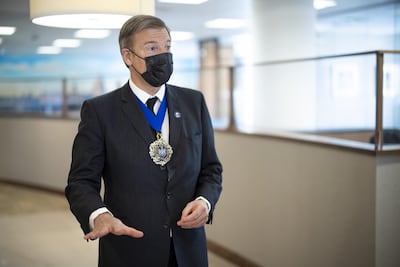The City of London is planning to transform empty office buildings into 1,500 new homes as part of a recovery plan to boost the Square Mile after it was hit hard by the economic fallout from the Covid-19 pandemic.
The City of London Corporation said it must adapt to "post-pandemic and social trends" to ensure it maintains its position as a world-leading ecosystem, a new report from its Recovery Task Force titled The Square Mile: Future City said.
The Corporation said it will work with the property sector to look for “ways to use vacant space” by aiming for at least 1,500 new residential units by 2030 through “sustainable, flexible and adaptable buildings”.
“Hope is now on the horizon as our economy starts to reopen bringing a semblance of normality to life in the City,” William Russell, Lord Mayor of the City of London, said on Tuesday.
“This report sets out how we can leverage this momentum and build back better. The Square Mile’s future is bright and we will rise to the challenge of adapting to the new normal that emerges after the pandemic.”
The Covid-19 crisis has reshaped the office space sector as employers opt for shorter leases and more employees work remotely, forcing providers to adapt their businesses and properties.
The pandemic forced the City of London’s 500,000 workforce to stay at home during three lockdowns in England, and the closure of cafes, restaurants and non-essential shops.
In January, when the financial district was immersed in its third lockdown, Mr Russell told The National that many major companies based in the Square Mile were planning a three-day office week post-pandemic, with office staff adopting the hybrid working model of dividing their time between home and the office.
A number of UK banks have since said they will adopt new working models, with HSBC planning to reduce its London office space by 40 per cent in the coming years as it expects a "much greater degree of hybrid working" once the pandemic is brought under control.
Office rental firm IWG said on Tuesday it has witnessed "unprecedented demand" for its flexible work products, suitable for a combination of office and remote working that has become the norm during the Covid-19 crisis.
The City of London’s recovery strategy, in partnership with consultancy Oliver Wyman, aims to make the financial district the most innovative, inclusive and sustainable business ecosystem, as well as an attractive place to work, live, learn and visit.
Among the proposals, the City wants to work with private sector partners to provide workspace, advice, digital skills, access to networks and capital in a bid to attract “high-potential tech-led businesses” not traditionally located in the Square Mile.
It also aims to hold on to its crown as London and the world's innovation and thought leadership hub, thanks to the plethora of sustainable finance, FinTech, Artificial Intelligence and creative companies based there.
A new Small Business Research and Enterprise Centre set to open next month will further support the creation and growth of sustainable small-to-medium enterprises in the City.
Meanwhile, low-cost, long-term leases in empty buildings will be offered to creative-sector tenants, with plans to boost the City’s weekend and night-time scene for leisure visitors through traffic-free Saturdays or Sundays in the summer.
The five-year campaign to regenerate the City will also see landlords encouraged to offer more flexible and adaptable offices suited to the new hybrid style of working for the post-pandemic workforce.
“We will work even more closely with the property sector to promote increasingly sustainable, flexible and adaptable buildings that people will thrive in. It will also be essential to continue to future-proof our supporting infrastructure, create more amazing public spaces and accelerate plans to make our streets more accessible,” said Alastair Moss, planning and transportation chairman at the City of London Corporation.
“Investors and developers continue to be confident in the future of the City office market and our planning pipeline is extremely busy. This is in anticipation of the take up of workspace stock as more people return to the Square Mile as the pre-eminent place for business in a world-class environment.”
Other proposals include a focus on digital infrastructure, such as a shared 5G network set for completion in the financial district by the end of next year.
Support will also be given to develop renewable energy, heat networks and smart grid infrastructure to enable the financial district's transition to net zero.
The Corporation will start pedestrianising several streets and participate in a London trial of e-scooters as part of its plans to improve public spaces, encourage more walking and jogging and allow communities to grow.
Catherine McGuiness, policy chairwoman at the City of London Corporation, said companies remain committed to retaining a central London hub but how they operate "will inevitably change to reflect post-pandemic trends, such as hybrid and flexible working".
“The Square Mile must evolve in order to provide an ecosystem that remains attractive to workers, visitors, learners and residents," Ms McGuiness said.
"This will involve encouraging growth, fostering talent from all backgrounds, providing a vibrant leisure offer and offering outstanding environments.”
More on the City of London
Hybrid model could become the norm for Britain’s post-Covid workforce
HSBC to cut London office space by 40% in switch to hybrid working trend
Why Rishi Sunak thinks City of London is set for a post-Brexit 'Big Bang 2.0'



